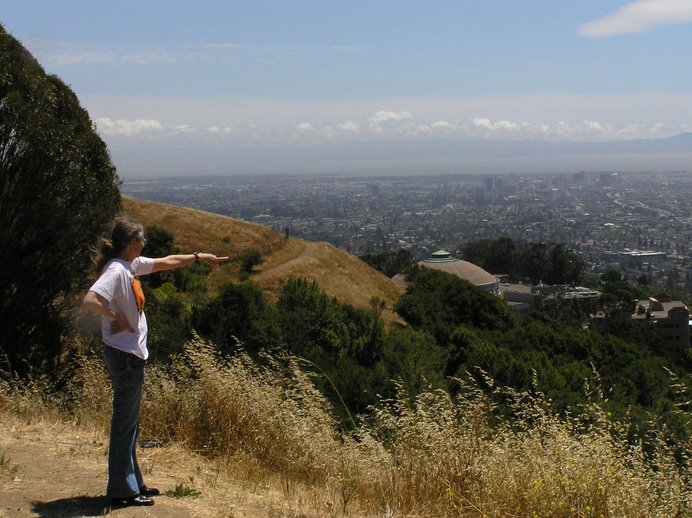Better than the Hilton?: US detention centers in Iraq
Today I went to a press conference held in Baghdad by US Marine Major General Douglas M. Stone. No refreshments were served.
General Stone gave such a rosy description of life in US detention centers here in Iraq that it made me wanna run out and become an insurgent just so I could get arrested and sent to one too. He made Camp Buca and Abu Ghraib sound like they were almost even better than the Hilton -- and certainly a lot better than the jails we got in California. San Quentin, take note.
I was writing so quickly at the press conference that I might have gotten some of the general's words wrong but here's what my notes say he said: "Our major goal here is to try to integrate detainees back into Iraqi society. We are also committed to broad transparency and public accountability. We work in cooperation with international laws and human rights regulations and we encourage visits and inspections to our facilities by the Red Cross and the press." Then Gen. Stone said the same thing in Arabic for the benefit of the Iraqi reporters present. Heck, I can hardly say "Salaam Aleikum" in Arabic. I was in awe
"We provide what the inmates need," continued the general, " including clothing, food, water for drinking and washing, medical care and education such as literacy programs and vocational training." Good on him. We could even use these types of programs in American jails. Would this man consider working at Sing Sing when he gets done with Iraq?
"The medical care for the prisoners is as good as the medical care that I receive myself," the general continued, "and the food is culturally appropriate. All meals meet or exceed international standards. And 7,000 of the detainees here have completed studies up to the fifth grade." Apparently there are approximately 25,000 detainees under US care. Many of them used to be illiterate but now they can read. Good job!
"Approximately 83% of the detainees are Sunni. 16% are Shi'a. We only have 280 third-country-nationals in detention." Each detainee's situation is considered individually and is released back into the community when he appears to be no longer a threat. "Before they are released, each detainee signs a pledge that they will no longer participate in violent insurgent activities and, so far, released detainees have honored their pledges 100%." Plus once they get out of jail, the detainees have developed new skills and stuff to allow them to support themselves economically as well.
"Our goal is to release all of the detainees under our care as soon as they become ready." Also, the general made the point again and again that the US is only in charge of the detention facilities here with the consent of the Iraqi government and if the Iraqis ever want to take over this little hotel-keeping operation themselves, then the US will immediately turn the detainees over to them.
Then the general called for a question-and-answer period from the press and I raised my hand. "General, this sounds like a very excellent program," I gushed, "and do you think, because it has been so successful here, that in the future our military is planning to apply these same standards of transparency and public accountability received by human rights groups and the press here to the Afghan detainees at Guantanamo Bay? And if the Afghan government requests to take over the detention program there as well, will detainees be allowed to return to Afghanistan?" And be released into their communities if they too take The Pledge? "Since this program is working so well in Iraq, let's try it in Guantanamo."
PS: I keep trying to add an attachment of a photograph of me in my "hotel room" at the airbase in Kuwait, but the computer keeps refusing to attach it. Why does this computer keep hatin' on my photograph? What, it's holding out for a photo of me at the Abu Ghraib Ritz?
skip to main |
skip to sidebar


Jane Stillwater is a freelance journalist, war correspondent, blogger, political Cassandra and author. Her latest motto is "Stop Wall Street, War Street, Big Pharma and Big Tech from destroying our world."

Blog Archive
-
▼
2007
(163)
-
▼
October
(19)
- Codetalkers: How to win friends & influence people...
- Heartbreak Hotel: Let's open up a resort and spa i...
- .Three weeks with the Marines in Iraq? Priceless! ...
- Madam Jane predicts: The Marines will be heroes in...
- In Iraq, "The war is over if you want it." ...
- Sweet Home Iraq: In Anbar province, I met the gove...
- Iraq's Anbar Province: The World's Next Top ...
- Eye witness report: Marines drop acid in western I...
- The Iraqi Book of the DeadMy friend Betsy just sen...
- Battle fatigue: Me and Oprah in the Green ZoneWhen...
- Bush leagues: How GWB lost the World Series to Ira...
- Final Jeapordy: And the correct answer is "What is...
- Here's a photo of my last big night out at the US ...
- Better than the Hilton?: US detention centers in I...
- Running for President in Iraq: Which candidate wil...
- Gossip Girl in Kuwait: Is IRAQ going to be Bush’s ...
- Joe T, they've gone and cancelled POPCORN!!!This t...
- Ramadan for dummies: How to survive without food u...
- Why Bishop Tutu would be an excellent resource to ...
-
▼
October
(19)
